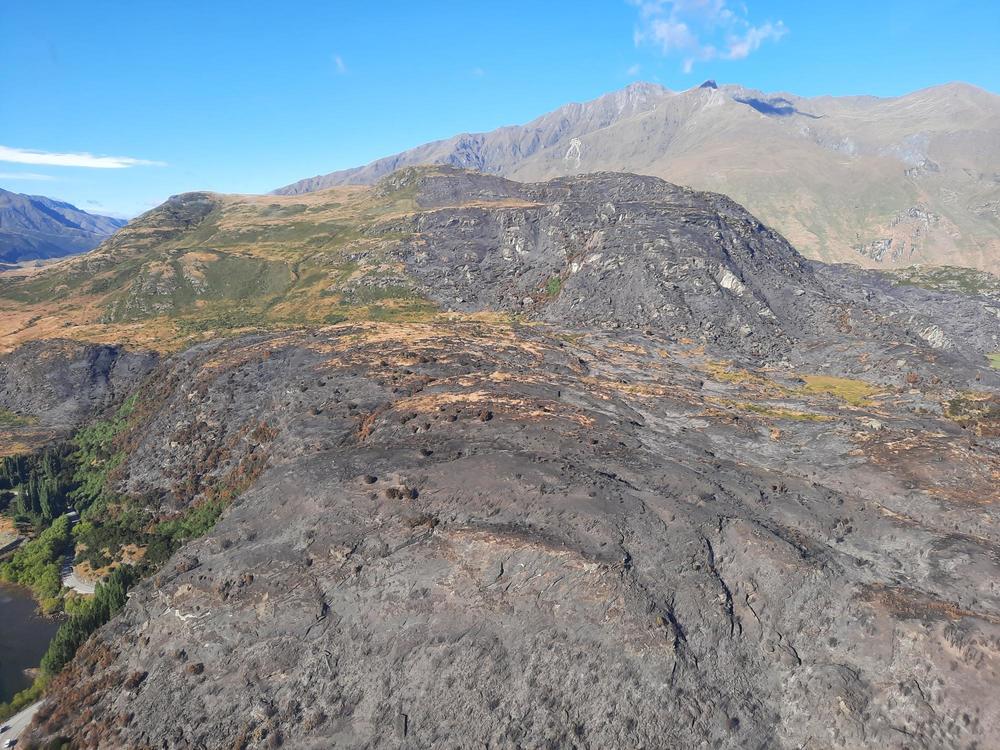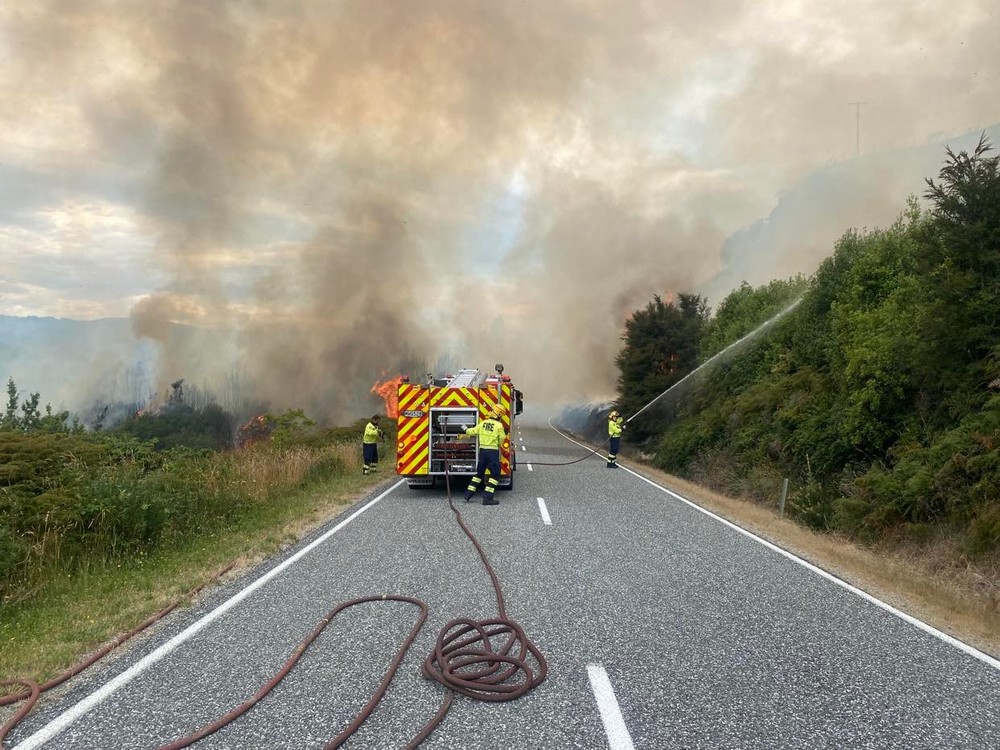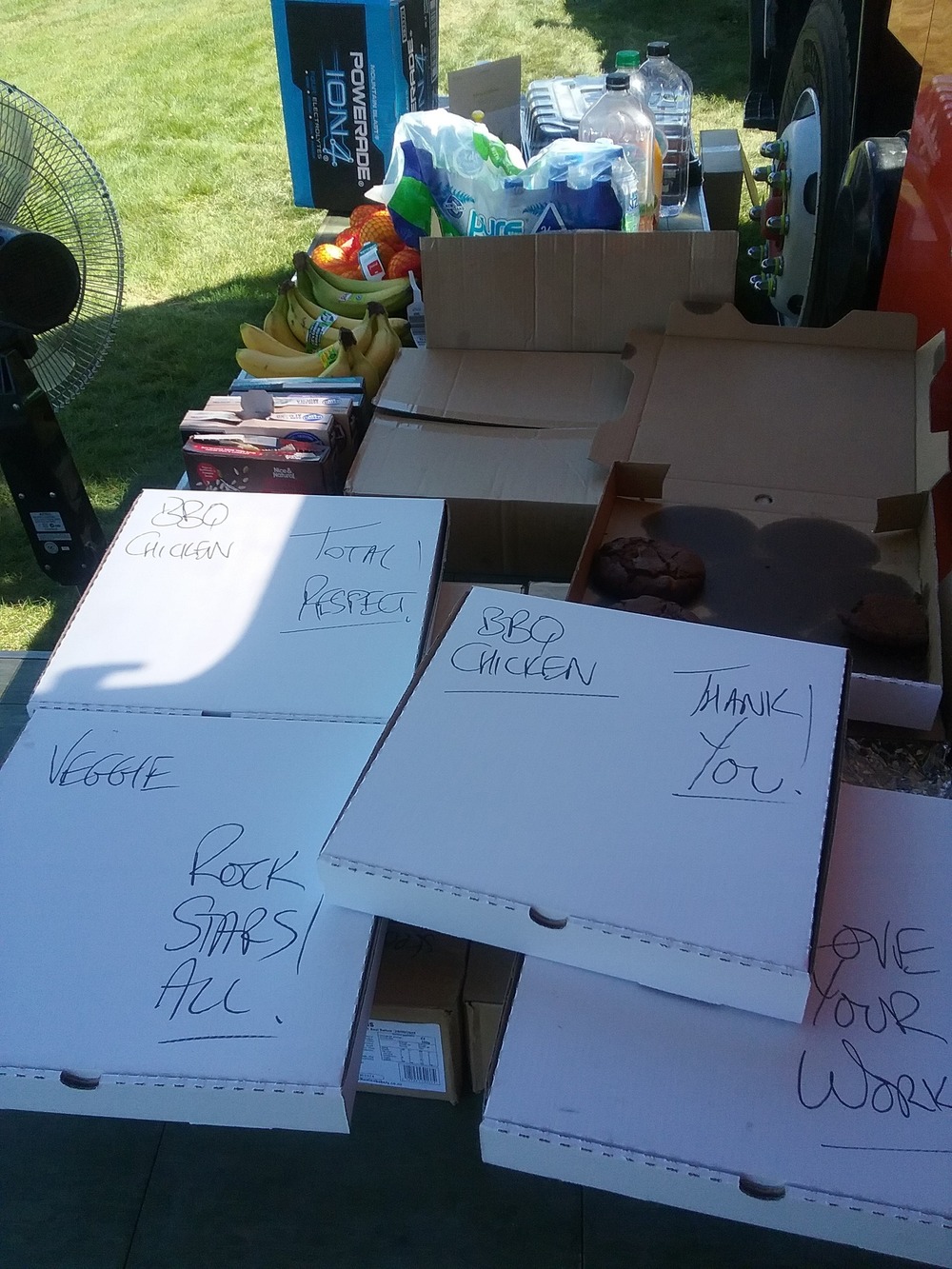‘It will grow back but I’ll be 100 by then’: Emerald Bay fire impacts
Sue Wards
12 January 2022, 5:06 PM
 The impact of the fire on Hospital Flat.
The impact of the fire on Hospital Flat. Fire and Emergency (FENZ) has scaled back its operations at the Emerald Bay fire, which is now fully contained.
The fire started on Department of Conservation land (DOC) near the lake at Emerald Bay and spread up the hill and across the road onto more DOC land and part of Glendhu Station.
The focus now is on mopping up the site and ensuring the fire remains within its seven kilometre perimeter, FENZ incident controller Jason Sarich said, and management of the fire has now been transferred to local FENZ assistant commander.
“There is confidence the fire will not spread further as the site is looking good with only a few hotspots,” Jason said.
But while the fire may be (mostly) out, work is not over for the individuals and groups who have spent years - and in some cases decades - to help regenerate the area.
The Wanaka App took a close look at the effect of such a fire on the Wānaka community.
Forty years of regeneration
Glendhu Station owner John McRae said while the farm “lost a lot of bush and a lot of wetlands up top” from this week’s fire, the main impact was emotional.
“I think the biggest loser is ecology and the environment,” he said.
The fire damaged area represents 40 years of regeneration work by Glendhu Station and DOC, with the input of biodiversity groups and the Wānaka Rock Climbing Club.

Glendhu Station lost wetlands and bush in the fire.
John said in the 1980s his parents chose to stop burning bracken, and gave the Otago Polytechnic, through long-time former resident Steve Henry, the opportunity to climb in the Hospital Flat area.
“To see it back to ground zero - Dad was pretty sad to see it,” John said.
“People forget how long it takes for things to grow. It will grow back but I’ll be 100 by then.”
Former DOC Wanaka area manager Paul Hellebrekers, who now undertakes trapping and other conservation work in the area, said the fire was “a hot burn, so it’s singed everything to the ground”.
He echoed John’s estimate that the land hasn’t been burned for around 40 years.
“I won’t see it [the native bush] return in my lifetime,” he said.
Emerald Bluffs landowner and environmentalist John May, who had been involved in regenerating native bush for over 20 years, told the Wānaka App the impact of the fire was extraordinary.
“The whole biodiversity is lost: skinks, geckos, birds’ nests - the whole thing is gone. That is really the extreme sadness of it.”
He said there are trees at Emerald Bluffs that are at least 100 years old, and there would be even older trees on Glendhu Bluffs.
While Emerald Bluffs were mostly spared, the adjacent DOC reserve was not. John estimated the cost to re-establish plants at well over $2M, adding there were about 40 traplines in the area. Planting damage for Emerald Bluffs alone was probably $50,000, and new fencing and trap replacement will be required.
Add in the cost of five or so years of weed control, and the balance sheet doesn’t look good.

Firefighters at work near Glendhu Bay.
Replanting the area will be a very slow process, John explained.
“They are not burning off a grass patch. I would say most of those plants won’t come back on their own. We have a very harsh climate. There are no seed sources anymore. If you get 25 percent back that will be a success but that may take 25 to 50 years, if at all.”
Recreation value lost
Wānaka rock climbing club co-presidents James-Anthony Keswick and Chris Warburton told the Wānaka App the fire has caused significant damage to Hospital Flat climbing areas.
“The WRCC will be liaising with DOC to determine when climbing can safely resume,” they said.
“We are saddened to see the impact on biodiversity and recreational groups who have invested a lot of their own time and money into better outcomes for the area and community."
WRCC volunteer Steve Moffatt monitors about eight traps in the Hospital Flat area, worth a combined $1,000. While a few of the traps were sponsored (by Aspiring Guides, Adventure Consultants, Basecamp Wānaka, and Wānaka Rock), Steve paid for the rest out of his own pocket.
Until he is allowed back to the area to check he doesn’t know how many traps have survived. Steve says possums, stoats, ferrets and rats are the usual suspects caught in the traps, and he’s noticed an increase in bird life and insects since trapping began.
“There was some lovely regenerating bush around the place. The 2019 fire [October 2019] took at least until the next spring before the bracken grew back, but weeds got established quickly.”
“As far as a recreation reserve goes it’s a pretty ugly place to be now.”
The fire fighters
The efforts to quell the fire began around 2pm on Sunday afternoon (January 9), and eventually included all the local fire brigades as well as units from elsewhere in Central Otago, as well as a flight of 10 helicopters with monsoon buckets.
Look a bit closer and you discover that our local volunteer firefighters include a wide range of people. In the case of the Luggate brigade, the fire fighters ranged from 76-year-old fire chief Rod Anderson (who will mark 50 years of fire fighting in this region later this year) to a 17-year-old Mount Aspiring School student on his first call-out.

Food provided for the firefighters by a grateful community.
“It’s got to be one of the most exciting and vicious fires we’ve had,” Rod said. “Without the helicopters we wouldn’t have stopped it.”
Locals dropped off food and drink for the firefighters, expressing their gratitude for their hot, tiring work.
“They treated us well,” Rod said.
The aftermath
John McRae said in his former farming life he was involved with a lot of fires for controlling vegetation, but said “I’ve never seen a fire move like that.”
“It will give everybody a sense of what can happen in a fire and prepare for the next one - because it will happen again,” he said.
“It’s done a lot of damage and it could have caused a loss of life. Everybody got lucky.”
John May said he was committed to assisting with the regeneration, but asked “how can we stop fires from happening?”.
“If it stays dry, we’re going to have a horrific fire season this year. The risk is going to be huge.
“In the future I hope we have more awareness. It’s very sad that the mishaps of very few destroy the enjoyment of most of us.”
Wānaka senior constable Bruce McLean said the police know the cause of the fire, and advised people to be careful cooking outside: “...use no naked flames or smoking in the outdoors where the ground is tinder dry.”
“A fire doesn’t take much to start and gets out of control very quickly,” he said.
FENZ said investigations are continuing.
PHOTOS: Supplied




